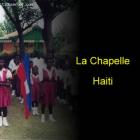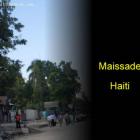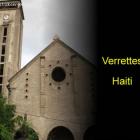ADVERTISEMENT
Voodoo ritual - Haiti Observer Blog
Voodoo ritual, Haiti Observer Blog. Read the following articles about Voodoo ritual
Haiti protests start with Damballah-Wedo Voodoo Symbol, campfire
Have you ever noticed that the majority of protests in Haiti often starts one way. Someone will draw in the middle of the street the Voodoo Symbol in Haitian language called Damballah-Wedo, then a campfire will be set right in the middle of the sign where people participate in song turning around the fire. I am trying to understand the meaning of all that. Anyone with some knowledge, please share with us. In Haitian Voodoo, Damballah-Wedo is viewed as a loving father to the world and associated with creation. However, in many protests in Haiti, we find lots of destruction. How do you explain that?
Riviera Beach man dead, believed to place voodoo curse
It will prove to be a case of which story is to be believed. In the case of the murder of Dennis Donahue, in which Haitian Valdano Riche has been indicted, the the court has already been witness to gruesome crime scene photographs which show the deceased lying on the ground, with his head suffused in blood. According to to the state attorney, the murder was committed because the accused wished to break a "spell" placed on him by the deceased. The evidence supporting this so far being more than that the defendant is of Haitian descent and voodoo is prevalent there, the state says it will show evidence from the interrogation of the defendant admitting to this version of events.
Ghede, Haitian Lwa That Embody Powers of Death & Fertility
The Ghede (often spelled as Gede or Guédé) Lwa families in Haiti practice powers of life, death and fertility through Haitian Vodou. They serve as the intermediaries between the creator god or the good god (Bon Dieu or Bondye) and humanity.
Ghede means 'the sacred dead'. "Lwa" often referred as 'Mystères and the Invisibles'-- are the spirits of Haitian Vodou. Fete Ghede or Gede Festival is a past-honoring event also known as the 'Festival of the Ancestors' performed on Second November every year in the honor of the 'Lord of the Dead'. It is the day to repay the boons granted by Ghede otherwise they will take revenge on you. During the ceremonies of Fete Ghede, there is always a spiritual procession to the cemetery. The women spiritual adepts are called 'mambos' and their male counterparts are known as 'houngans'. They join drummers and singers at the festivals and pray at a cross rising from a tomb; summon the spirits before the party begins.
Lakou Souvenance, Soukri and Badjo during Guede Festival
The three most popular Voodoo sites in Haiti are Lakou Souvenance, Soukri and Badjo. These 3 houses are among the oldest in Haiti with large membership of voodoo practitioners performing authentic African traditions. Souvenance is known for Rada, Soukri tractices Petro and Badjo practices Nago
These Voodoo sites attract foreigners and locals in large numbers. In the past, this site would attract visitors from all over the world when they are having their annual festival. The Haitian government sees a possibility for the three Voodoo sites to attract tourists thereby help the country to generate additional revenue.
Plaine-du-Nord and Saint Jacques Fiesta
Haiti's Nord Department is in the northern most part of the country. It is where the small municipality of Plaine-du-Nord, often referred to as Plèn dinò in Creole, is located. It is considered an essential part of Haitian history and is one of the centres of the voodoo religion in the country.
Plaine-du-Nord is the historical site where the battle between Haiti's French colonizers and African slaves who worked in plantations began. This led to Haiti's independence from its colonizers and the freedom of slaves who became the very first official Haitians. The municipality is currently considered as the country's Pilgrimage Festival capital, which attracts thousands of worshippers and foreign visitors yearly. One of Plain-du-Nord's biggest, most important festivals is the Saint Jacques Fiesta, which is celebrated every 25th of July. It is then followed by the Saint Anne celebration a day after. Pilgrims usually stay for 15 days in the municipality during these festivities in order to offer food to the less fortunate, light candles, and donate money to the local churches.
Our objective is to share with you news and information about Haiti and the people of Haiti. Traditions, habits and the way we were or grew are alive in this site. We highly recommend that you Subscribe to our Newsletter and also share with us some of the things that are memorable and made us unique people.

 La Chapelle, Haiti
La Chapelle, Haiti  Maissade, Haiti
Maissade, Haiti  Haitian Creole Translation
Haitian Creole Translation  Verrettes, Haiti
Verrettes, Haiti  Haitian Thanksgiving
Haitian Thanksgiving